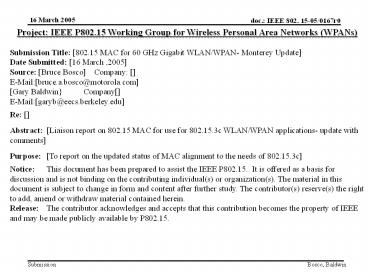TG3 Overview of the Draft Standard - PowerPoint PPT Presentation
Title:
TG3 Overview of the Draft Standard
Description:
Project: IEEE P802.15 Working Group for Wireless Personal Area Networks (WPANs) ... by Bruce Bosco and Gary Baldwin and are not verbatim. Further editing was also ... – PowerPoint PPT presentation
Number of Views:14
Avg rating:3.0/5.0
Title: TG3 Overview of the Draft Standard
1
Project IEEE P802.15 Working Group for Wireless
Personal Area Networks (WPANs) Submission Title
802.15 MAC for 60 GHz Gigabit WLAN/WPAN-
Monterey Update Date Submitted 16 March
,2005 Source Bruce Bosco Company
E-Mailbruce.a.bosco_at_motorola.com Gary
Baldwin Company E-Mailgaryb_at_eecs.berkeley.edu
Re Abstract Liaison report on 802.15 MAC
for use for 802.15.3c WLAN/WPAN applications-
update with comments Purpose To report on the
updated status of MAC alignment to the needs of
802.15.3c Notice This document has been
prepared to assist the IEEE P802.15. It is
offered as a basis for discussion and is not
binding on the contributing individual(s) or
organization(s). The material in this document is
subject to change in form and content after
further study. The contributor(s) reserve(s) the
right to add, amend or withdraw material
contained herein. Release The contributor
acknowledges and accepts that this contribution
becomes the property of IEEE and may be made
publicly available by P802.15.
2
MAC for 802.15.3c Applications
- Overview of some proposed applications
- Wireless gigabit ethernet replacement
- gt2 Gbps
- P-MP and/or
- P-P
- Digital video distribution
- With simultaneous analog TV option
- P-MP
- Real time high definition video
- 3-D
- Virtual reality
- Interactive scenarios
3
- Data downloads wireless firewire
- P-P
- Examples
- Ipod-like device
- Digital camcorder
- For near-term applications, it might be proposed
that most applications will require either - Short, high data rate bursts
- 2 Gbps or greater or
- Very long, but lower data rate streams
- 1 Gbps (possibly even lower)
- Very low latency
- Very high QOS
4
MAC for 802.15.3c ApplicationsQuestions and
Concerns
- What, in general, is the limiting factor for the
proposed MAC in regards to maximum data rates? - Latency
- Doesnt generally limit data rate
- Overhead
- Worry about what the base rate would be this
tells how long the header duration is. - Lowest rate will dominate. Ratio of highest to
lowest data rates should be 51 or less. Dont
handle low data rates by restrictions in the PHY
low rates are established to extend the range. - QOS
- Others?
- Disclaimer Comments in bold italics are from
James Gilb and John Sarallo in - attendance at the 802.15 SG3c meeting on 18
January 2005 as roughly transcribed - by Bruce Bosco and Gary Baldwin and are not
verbatim. Further editing was also - performed in an attempt to capture the key
points.
5
- Will the MAC, as is, support 2.5 Gbps data
rates? What is maximum? - Will support 2.5 Gbps but some things need to be
looked at - Clocks better than 25 ppm
- OR resync beacons
- Could subset of MAC be implemented that may ease
data rate restrictions? At what costs? - No improvement
- Is MAC most able to support multi-gigabit data
rates for - Burst-type transmissions vs
- Bursty data transfer is not 15.3s forte wastes
channel time - Continuous streaming ?
- 15.3 does this best
- Or are both modes equally supported?
- Yes. (?)
6
- Recommendations from key 802.15 MAC consultants
on how to proceed - What areas to watch
- Get the PHY sketched out first
- Channelization scheme
- Aggregate channels X thruput
- Calculation spreadsheet in archives
- Need to determine max framesize etc
- SIFT ACK pure overhead
- Refer to Table 61, MAC sublayer parameters 2 2.4
GHz PHY dependent (see Appendix A)
7
- Contacts and liaisons
- Champion for .3c application
- SG3c needs to promote own champion
- Other Comments
- CSMA with steerable antennas would, potentially,
create all sorts of problems would limit
efficiency and throughput steerable antennas
might work better with TDMA. - Question was asked about TV transmission should
it be ackd or not? Gilb has a demo doing that in
the 2.4 band.
8
- Appendix A
- From 802.15.3 Standard































